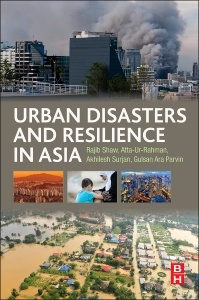Urban Disasters and Resilience in Asia
Auteurs : Shaw Rajib, Atta-ur-Rahman , Surjan Akhilesh, Parvin Gulsan Ara

Urban Disasters and Resilience in Asia presents the latest information on the intensity and frequency of disasters. Specifically, the fact that, in urban areas, more than 50% of the world's population is living on just 2% of the land surface, with most of these cities located in Asia and developing countries that have high vulnerability and intensification.
The book offers an in-depth and multidisciplinary approach to reducing the impact of disasters by examining specific evidence from events in these areas that can be used to develop best practices and increase urban resilience worldwide.
As urban resilience is largely a function of resilient and resourceful citizens, building cities which are more resilient internally and externally can lead to more productive economic returns. In an era of rapid urbanization and increasing disaster risks and vulnerabilities in Asian cities, Urban Disasters and Resilience in Asia is an invaluable tool for policy makers, researchers, and practitioners working in both public and private sectors.
Renowned scientist Dr. Atta-ur-Rahman was appointed as the chairman of United Nations’ committee on Science, Technology and Innovation in March 2016. Formerly Professor Emeritus, International Center for Chemical and Biological Sciences (H. E. J. Research Institute of Chemistry and Dr. Panjwani Center for Molecular Medicine and Drug Research), University of Karachi, Pakistan, he was Pakistan Federal Minister for Science and Technology (2000-2002), Federal Minister of Education (2002), and Chairman of the Higher Education Commission with the status of a Federal Minister from 2002-2008. He is a Fellow of the Royal Society of London (FRS) and an UNESCO Science Laureate. A leading scientist, he also has over 930 publications to his name in several fields of organic chemistry.
Dr. Akhilesh Surjan has successfully engaged with issues of climate and disas
- Explores a broad range of aspects of disaster and urban resiliency, including environmental, economic, architectural, and engineering factors
- Bridges the gap between urban resilience and rural areas and community building
- Provides evidence-based data that can lead to improved disaster resiliency in urban Asia
- Focuses on Asian cities, some of the most densely populated areas on the planet, where disasters are particularly devastating
Date de parution : 01-2016
Ouvrage de 368 p.
15.2x22.8 cm
Thèmes d’Urban Disasters and Resilience in Asia :
Mots-clés :
agriculture; Asia; building codes; challenges; change agents; Cities; climate change; Climate Disaster Resilience Index (CDRI)Climate migration; climatic variability; Coastal cities; coastal hazards; Community resiliency; developing countries; developing regions; Dhaka Metropolitan Development Plan 1995�2015 (DMDP 1995�2015)Dhaka; disaster risk reduction (DRR)city government; disaster risk reduction (DRR)urban disaster resilience; Disaster risk reduction (DRR)urban; disaster risk; earthquake



